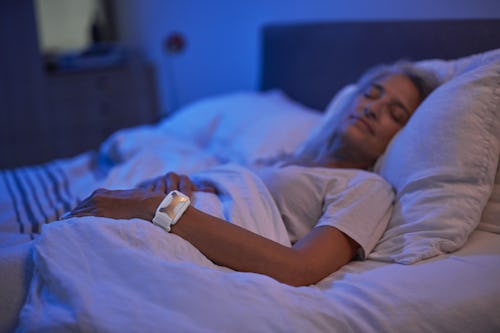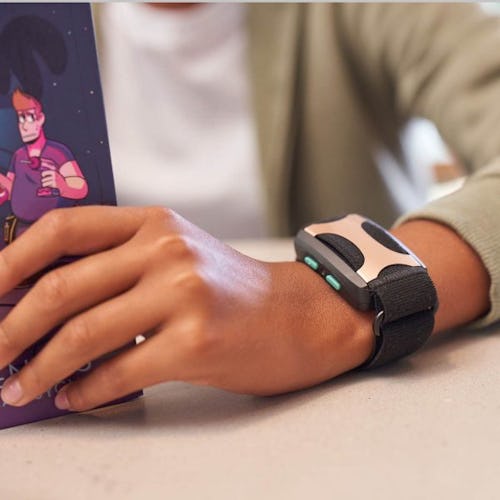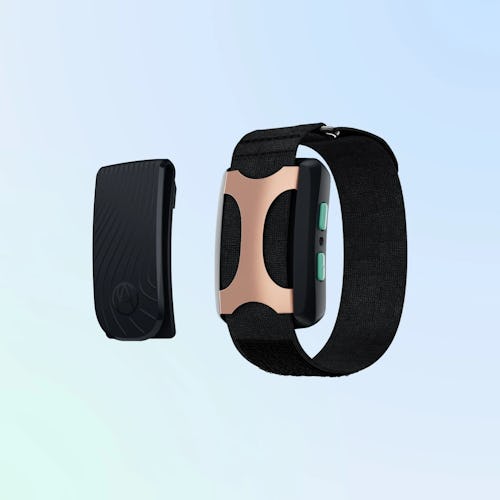
Now that my youngest child sleeps through the night, I’ve been determined to get acquainted with quality rest. But what are an insomniac’s options when you’re seemingly immune to white noise machines, meditation, and counting sheep? The developers behind the Apollo wearable device have set out to offer another solution for poor sleepers. After first hearing about it from a fellow editor, I was intrigued to learn more about the device that was designed to be a long-term tool to combat stress and improve sleep.

What Is The Apollo
The Apollo is a self-described “wearable hug for your not-so-nervous system.” Unlike traditional health trackers, which primarily log your biometric data, the Apollo actively attempts to improve your health using touch therapy. The watch-like device emits a pattern of silent vibrations that can activate the parasympathetic nervous system, lower heart rate, and increase heart rate variability, according to the brand. The Apollo aims to optimize mental and physical performance whether you're at rest or engaged in intense activity — all while providing a sense of calm and security.
The Apollo wearable is $399 (plus shipping and handling); and while some people can’t put a price on good sleep, I would consider this purchase an investment. However, Apollo Neuro’s online shop also offers discounted refurbished models with a one-year warranty.
Also, the Apollo is backed by a 30-day money-back guarantee from the date of delivery — so there’s seemingly nothing to lose by trying it out.
How To Use The Apollo
The Apollo wearable can be affixed to your wrist or ankle using a soft, hook-and-loop strap — or to a shirt collar, bra strap, or waistband using a clip. It works via an app, which you can use to set the device on one of seven modes or set a schedule; selections include “energy and wake up,” “social and open,” and “clear and focused.”
For each mode, you can select a duration and intensity level. The brand recommends using the wearable anywhere between 15 and 60 minutes, starting at a lower intensity of 20 to 40%, for at least three hours a day, five days a week.
Different goals will require different configurations. For example, 15 minutes at 20% intensity is all you need when getting out of bed in the morning; but if you’re using the Apollo for better sleep, you’ll want to strap it on up to an hour before you plan to settle into bed.

About Apollo Neuroscience
Apollo Neuroscience was founded by David Rabin M.D., Ph.D., a neuroscientist and board-certified psychiatrist. Dr. Rabin (who also goes by “Dr. Dave”) earned his degrees at Albany Medical College and specialized in psychiatry at Western Psychiatric Institute & Clinic at the University of Pittsburgh Medical Center. His research at the University’s Program in Cognitive Affective Neuroscience is where the technology for the Apollo has its roots.
Co-founder and CEO Kathryn Fantauzzi has a B.A. from Smith College and a Master of Public Administration (MPA), with a focus on behavioral economics and finance, from the Rockefeller College of Public Affairs and Policy. (She and Rabin also happen to be married.)
Apollo Neuroscience also boasts a diverse Scientific Advisory Board that includes Ivy League-trained M.D.s, medical fellows, and Ph.D.s.
The Science Behind The Apollo
The team behind the Apollo wearable may have impressive credentials, but the device is also back by its performance in multiple clinical trials conducted by the brand. Based on research from six completed trials (with nine more ongoing), subjects using the Apollo experienced, on average:
- 19% more time in deep sleep
- 40% less stress and feelings of anxiety
- 11% increase in heart rate variability (or HRV)
- Up to 25% more focus and concentration
Note that the Apollo has its critics, too. In 2021, Robert H. Shmerling, M.D., Senior Faculty Editor of Harvard Health Publishing wrote that “the marketing has gotten way ahead of the science” and requested more “solid evidence” to back up the brand’s claims. Another review, co-authored by anesthesiologist Taylor Graber, M.D., advised consumers, “to be wary of claims of efficacy based on ‘preliminary results’ […] Until the full study is published and researchers can analyze the study methodology and full data set, we do not believe early results are particularly valuable (though we do believe it's a good sign that the company is engaged in a number of legitimate research trials).”
What Reviewers Say About The Apollo
All that considered, many reviewers seemed to note positive changes from consistent use of the Apollo, with some finding a decrease in anxiety and others remarking on an improvement in sleep quality.
“I’ve been using my Apollo Neuro for several weeks, and I seem to be handling stress better since using I started using it. I’m also tracking my HRV using an Oura ring, and in the first 3 weeks my HRV increased by 18%, which is a great indicator that the Apollo Neuro is working. Highly recommend the Apollo Neuro to anyone who finds life a bit overwhelming at times, and thank you to Apollo Neuroscience for bringing it to market!” —Shala N.
“I believe Apollo has assisted in decreasing the time of lying in bed wide awake. I recommend it to my fellow insomniacs.” —Marsha E.
“I bought it for my wife. She was having anxiety and unable to sleep but only a few hours a night. Now, with Apollo, she falls right to sleep and sleeps wonderfully. Best purchase I could have made for her. The only area of improvement is the battery from what we see.” —Ray T.
“I appreciate the flexibility that this clip provided. Sometimes I don’t want to wear a band on my wrist or ankle. This gives me the ability to discreetly receive the benefits of my Apollo. I generally put it on in the morning and wear it continuously so the clip is very comfortable. At night I switch back to the band on my ankle.” —Lori B.
0 comments:
Post a Comment